Legal Report: Contract Law Analysis of Two Scenarios (Law)
VerifiedAdded on 2023/06/10
|6
|1369
|185
Report
AI Summary
This report provides a legal analysis of two distinct scenarios related to contract law. The first scenario examines the concept of undue influence, focusing on a situation where apprentice beauticians are pressured to purchase expensive products. The analysis explores the elements required to establish undue influence, potential legal remedies, and relevant case law, such as Johnson v Buttress. The second scenario involves a memorandum to a manager, offering legal advice on a lease agreement. It addresses key issues like relevant legislation (Real Property Act 1900), essential terms to include in the lease, rent increase regulations, statutory and operating expenses, and the obligations of landlords and tenants regarding building maintenance. The report highlights the importance of clearly defined obligations in commercial leases.
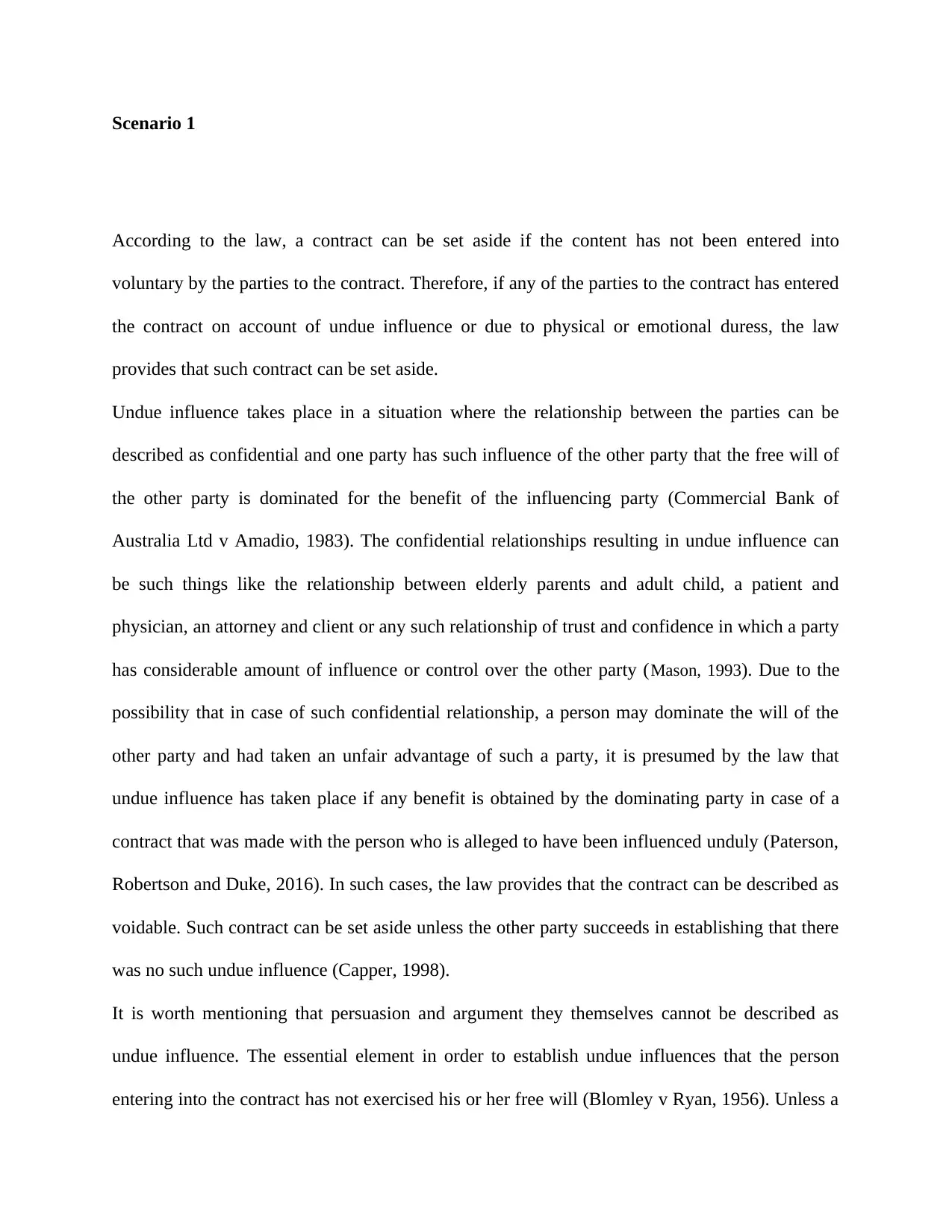
Scenario 1
According to the law, a contract can be set aside if the content has not been entered into
voluntary by the parties to the contract. Therefore, if any of the parties to the contract has entered
the contract on account of undue influence or due to physical or emotional duress, the law
provides that such contract can be set aside.
Undue influence takes place in a situation where the relationship between the parties can be
described as confidential and one party has such influence of the other party that the free will of
the other party is dominated for the benefit of the influencing party (Commercial Bank of
Australia Ltd v Amadio, 1983). The confidential relationships resulting in undue influence can
be such things like the relationship between elderly parents and adult child, a patient and
physician, an attorney and client or any such relationship of trust and confidence in which a party
has considerable amount of influence or control over the other party (Mason, 1993). Due to the
possibility that in case of such confidential relationship, a person may dominate the will of the
other party and had taken an unfair advantage of such a party, it is presumed by the law that
undue influence has taken place if any benefit is obtained by the dominating party in case of a
contract that was made with the person who is alleged to have been influenced unduly (Paterson,
Robertson and Duke, 2016). In such cases, the law provides that the contract can be described as
voidable. Such contract can be set aside unless the other party succeeds in establishing that there
was no such undue influence (Capper, 1998).
It is worth mentioning that persuasion and argument they themselves cannot be described as
undue influence. The essential element in order to establish undue influences that the person
entering into the contract has not exercised his or her free will (Blomley v Ryan, 1956). Unless a
According to the law, a contract can be set aside if the content has not been entered into
voluntary by the parties to the contract. Therefore, if any of the parties to the contract has entered
the contract on account of undue influence or due to physical or emotional duress, the law
provides that such contract can be set aside.
Undue influence takes place in a situation where the relationship between the parties can be
described as confidential and one party has such influence of the other party that the free will of
the other party is dominated for the benefit of the influencing party (Commercial Bank of
Australia Ltd v Amadio, 1983). The confidential relationships resulting in undue influence can
be such things like the relationship between elderly parents and adult child, a patient and
physician, an attorney and client or any such relationship of trust and confidence in which a party
has considerable amount of influence or control over the other party (Mason, 1993). Due to the
possibility that in case of such confidential relationship, a person may dominate the will of the
other party and had taken an unfair advantage of such a party, it is presumed by the law that
undue influence has taken place if any benefit is obtained by the dominating party in case of a
contract that was made with the person who is alleged to have been influenced unduly (Paterson,
Robertson and Duke, 2016). In such cases, the law provides that the contract can be described as
voidable. Such contract can be set aside unless the other party succeeds in establishing that there
was no such undue influence (Capper, 1998).
It is worth mentioning that persuasion and argument they themselves cannot be described as
undue influence. The essential element in order to establish undue influences that the person
entering into the contract has not exercised his or her free will (Blomley v Ryan, 1956). Unless a
Paraphrase This Document
Need a fresh take? Get an instant paraphrase of this document with our AI Paraphraser
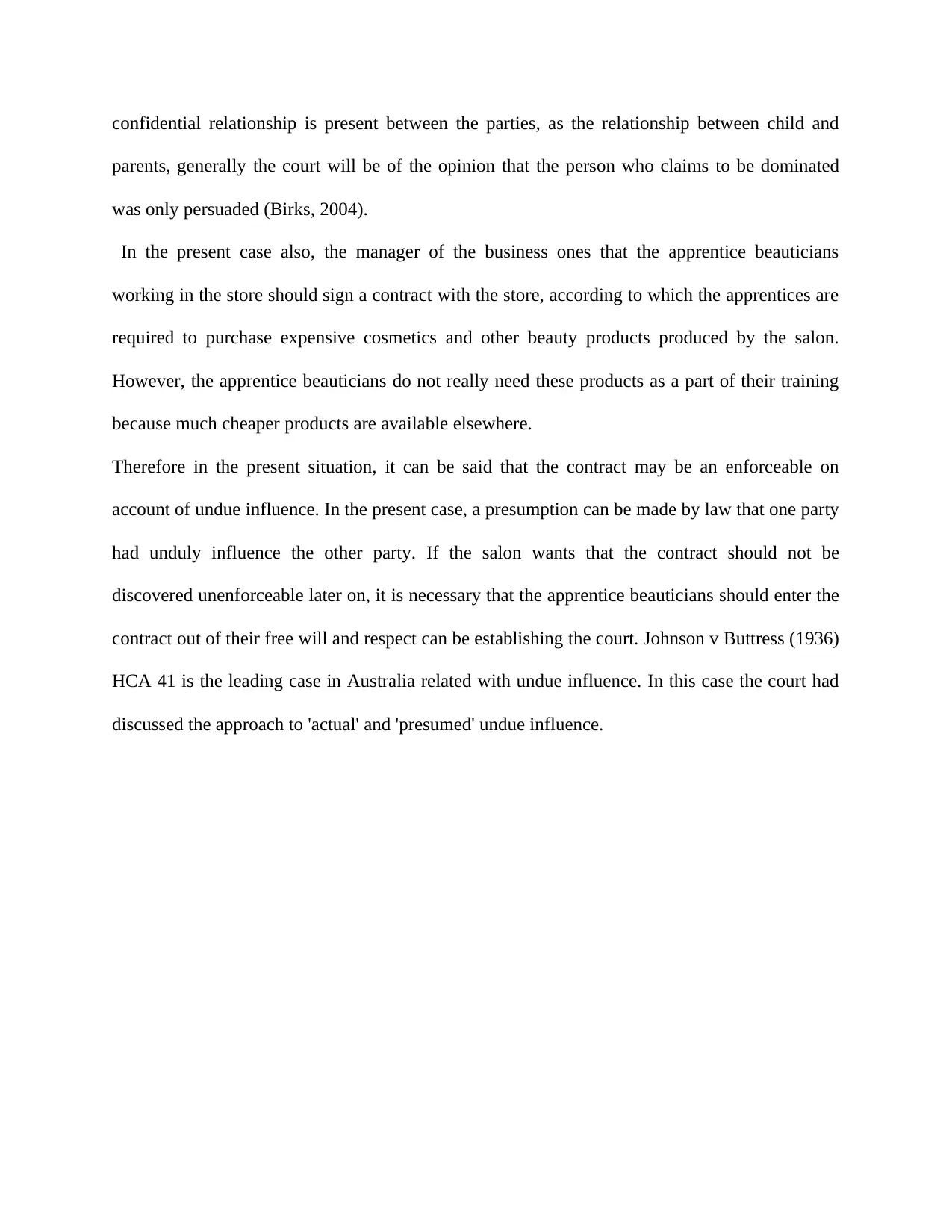
confidential relationship is present between the parties, as the relationship between child and
parents, generally the court will be of the opinion that the person who claims to be dominated
was only persuaded (Birks, 2004).
In the present case also, the manager of the business ones that the apprentice beauticians
working in the store should sign a contract with the store, according to which the apprentices are
required to purchase expensive cosmetics and other beauty products produced by the salon.
However, the apprentice beauticians do not really need these products as a part of their training
because much cheaper products are available elsewhere.
Therefore in the present situation, it can be said that the contract may be an enforceable on
account of undue influence. In the present case, a presumption can be made by law that one party
had unduly influence the other party. If the salon wants that the contract should not be
discovered unenforceable later on, it is necessary that the apprentice beauticians should enter the
contract out of their free will and respect can be establishing the court. Johnson v Buttress (1936)
HCA 41 is the leading case in Australia related with undue influence. In this case the court had
discussed the approach to 'actual' and 'presumed' undue influence.
parents, generally the court will be of the opinion that the person who claims to be dominated
was only persuaded (Birks, 2004).
In the present case also, the manager of the business ones that the apprentice beauticians
working in the store should sign a contract with the store, according to which the apprentices are
required to purchase expensive cosmetics and other beauty products produced by the salon.
However, the apprentice beauticians do not really need these products as a part of their training
because much cheaper products are available elsewhere.
Therefore in the present situation, it can be said that the contract may be an enforceable on
account of undue influence. In the present case, a presumption can be made by law that one party
had unduly influence the other party. If the salon wants that the contract should not be
discovered unenforceable later on, it is necessary that the apprentice beauticians should enter the
contract out of their free will and respect can be establishing the court. Johnson v Buttress (1936)
HCA 41 is the leading case in Australia related with undue influence. In this case the court had
discussed the approach to 'actual' and 'presumed' undue influence.
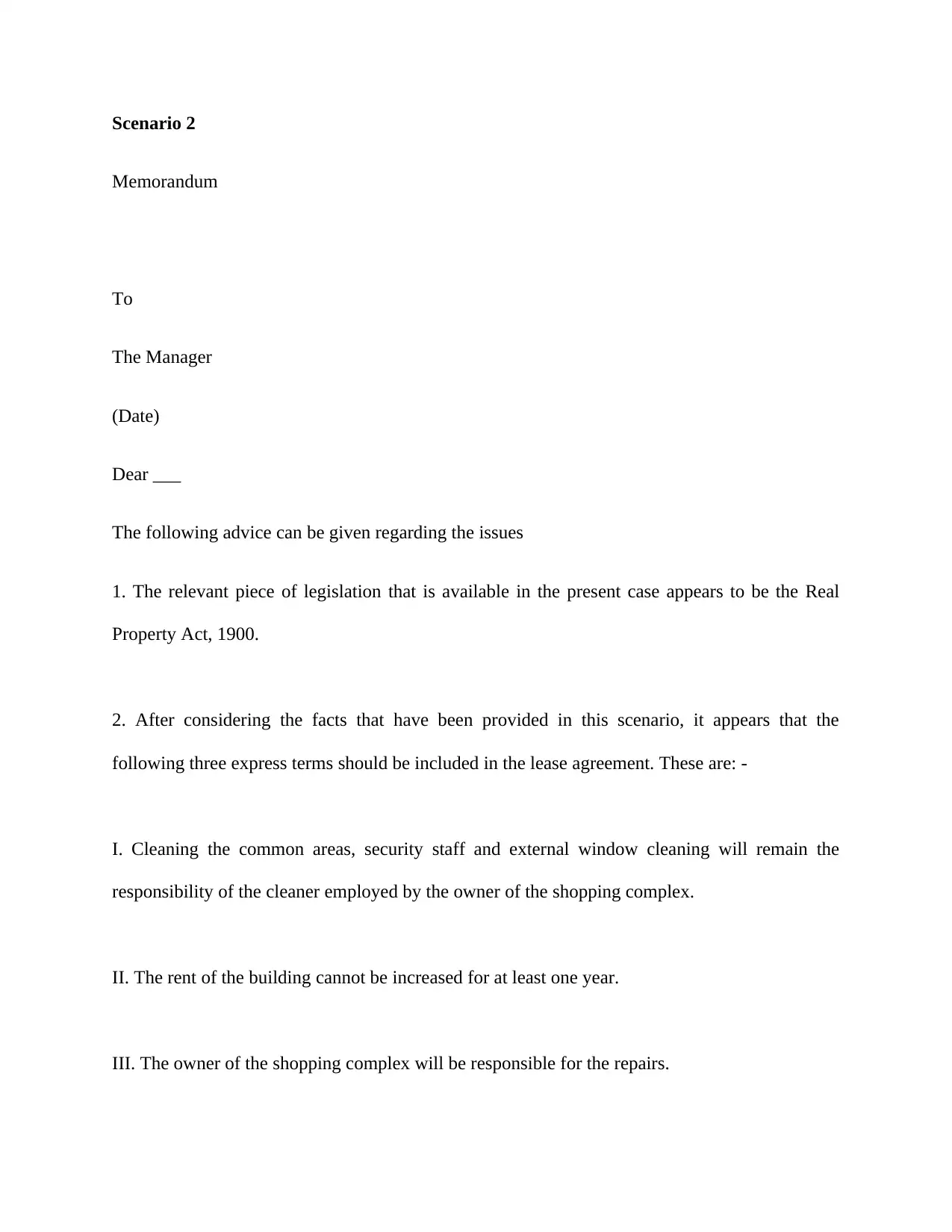
Scenario 2
Memorandum
To
The Manager
(Date)
Dear ___
The following advice can be given regarding the issues
1. The relevant piece of legislation that is available in the present case appears to be the Real
Property Act, 1900.
2. After considering the facts that have been provided in this scenario, it appears that the
following three express terms should be included in the lease agreement. These are: -
I. Cleaning the common areas, security staff and external window cleaning will remain the
responsibility of the cleaner employed by the owner of the shopping complex.
II. The rent of the building cannot be increased for at least one year.
III. The owner of the shopping complex will be responsible for the repairs.
Memorandum
To
The Manager
(Date)
Dear ___
The following advice can be given regarding the issues
1. The relevant piece of legislation that is available in the present case appears to be the Real
Property Act, 1900.
2. After considering the facts that have been provided in this scenario, it appears that the
following three express terms should be included in the lease agreement. These are: -
I. Cleaning the common areas, security staff and external window cleaning will remain the
responsibility of the cleaner employed by the owner of the shopping complex.
II. The rent of the building cannot be increased for at least one year.
III. The owner of the shopping complex will be responsible for the repairs.
⊘ This is a preview!⊘
Do you want full access?
Subscribe today to unlock all pages.

Trusted by 1+ million students worldwide
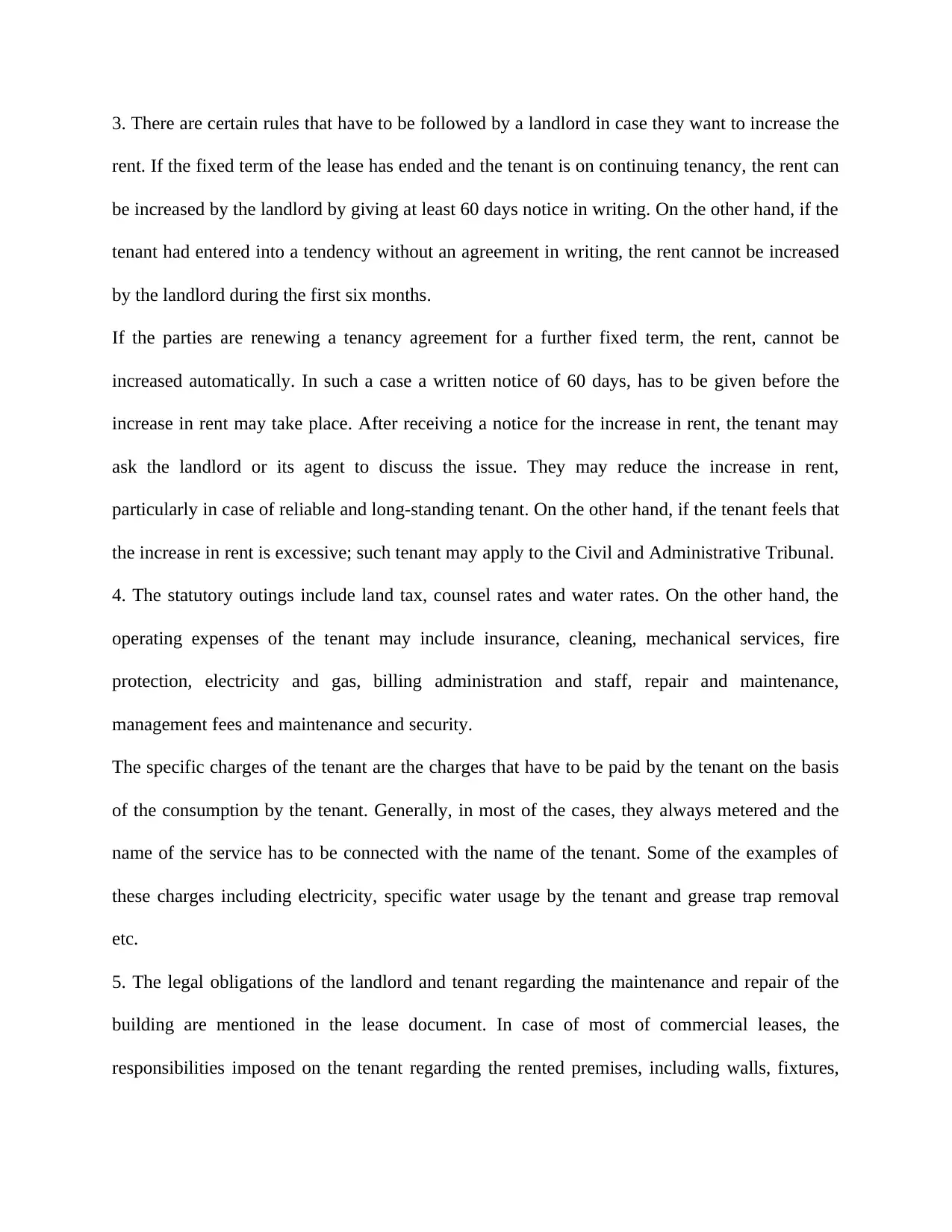
3. There are certain rules that have to be followed by a landlord in case they want to increase the
rent. If the fixed term of the lease has ended and the tenant is on continuing tenancy, the rent can
be increased by the landlord by giving at least 60 days notice in writing. On the other hand, if the
tenant had entered into a tendency without an agreement in writing, the rent cannot be increased
by the landlord during the first six months.
If the parties are renewing a tenancy agreement for a further fixed term, the rent, cannot be
increased automatically. In such a case a written notice of 60 days, has to be given before the
increase in rent may take place. After receiving a notice for the increase in rent, the tenant may
ask the landlord or its agent to discuss the issue. They may reduce the increase in rent,
particularly in case of reliable and long-standing tenant. On the other hand, if the tenant feels that
the increase in rent is excessive; such tenant may apply to the Civil and Administrative Tribunal.
4. The statutory outings include land tax, counsel rates and water rates. On the other hand, the
operating expenses of the tenant may include insurance, cleaning, mechanical services, fire
protection, electricity and gas, billing administration and staff, repair and maintenance,
management fees and maintenance and security.
The specific charges of the tenant are the charges that have to be paid by the tenant on the basis
of the consumption by the tenant. Generally, in most of the cases, they always metered and the
name of the service has to be connected with the name of the tenant. Some of the examples of
these charges including electricity, specific water usage by the tenant and grease trap removal
etc.
5. The legal obligations of the landlord and tenant regarding the maintenance and repair of the
building are mentioned in the lease document. In case of most of commercial leases, the
responsibilities imposed on the tenant regarding the rented premises, including walls, fixtures,
rent. If the fixed term of the lease has ended and the tenant is on continuing tenancy, the rent can
be increased by the landlord by giving at least 60 days notice in writing. On the other hand, if the
tenant had entered into a tendency without an agreement in writing, the rent cannot be increased
by the landlord during the first six months.
If the parties are renewing a tenancy agreement for a further fixed term, the rent, cannot be
increased automatically. In such a case a written notice of 60 days, has to be given before the
increase in rent may take place. After receiving a notice for the increase in rent, the tenant may
ask the landlord or its agent to discuss the issue. They may reduce the increase in rent,
particularly in case of reliable and long-standing tenant. On the other hand, if the tenant feels that
the increase in rent is excessive; such tenant may apply to the Civil and Administrative Tribunal.
4. The statutory outings include land tax, counsel rates and water rates. On the other hand, the
operating expenses of the tenant may include insurance, cleaning, mechanical services, fire
protection, electricity and gas, billing administration and staff, repair and maintenance,
management fees and maintenance and security.
The specific charges of the tenant are the charges that have to be paid by the tenant on the basis
of the consumption by the tenant. Generally, in most of the cases, they always metered and the
name of the service has to be connected with the name of the tenant. Some of the examples of
these charges including electricity, specific water usage by the tenant and grease trap removal
etc.
5. The legal obligations of the landlord and tenant regarding the maintenance and repair of the
building are mentioned in the lease document. In case of most of commercial leases, the
responsibilities imposed on the tenant regarding the rented premises, including walls, fixtures,
Paraphrase This Document
Need a fresh take? Get an instant paraphrase of this document with our AI Paraphraser
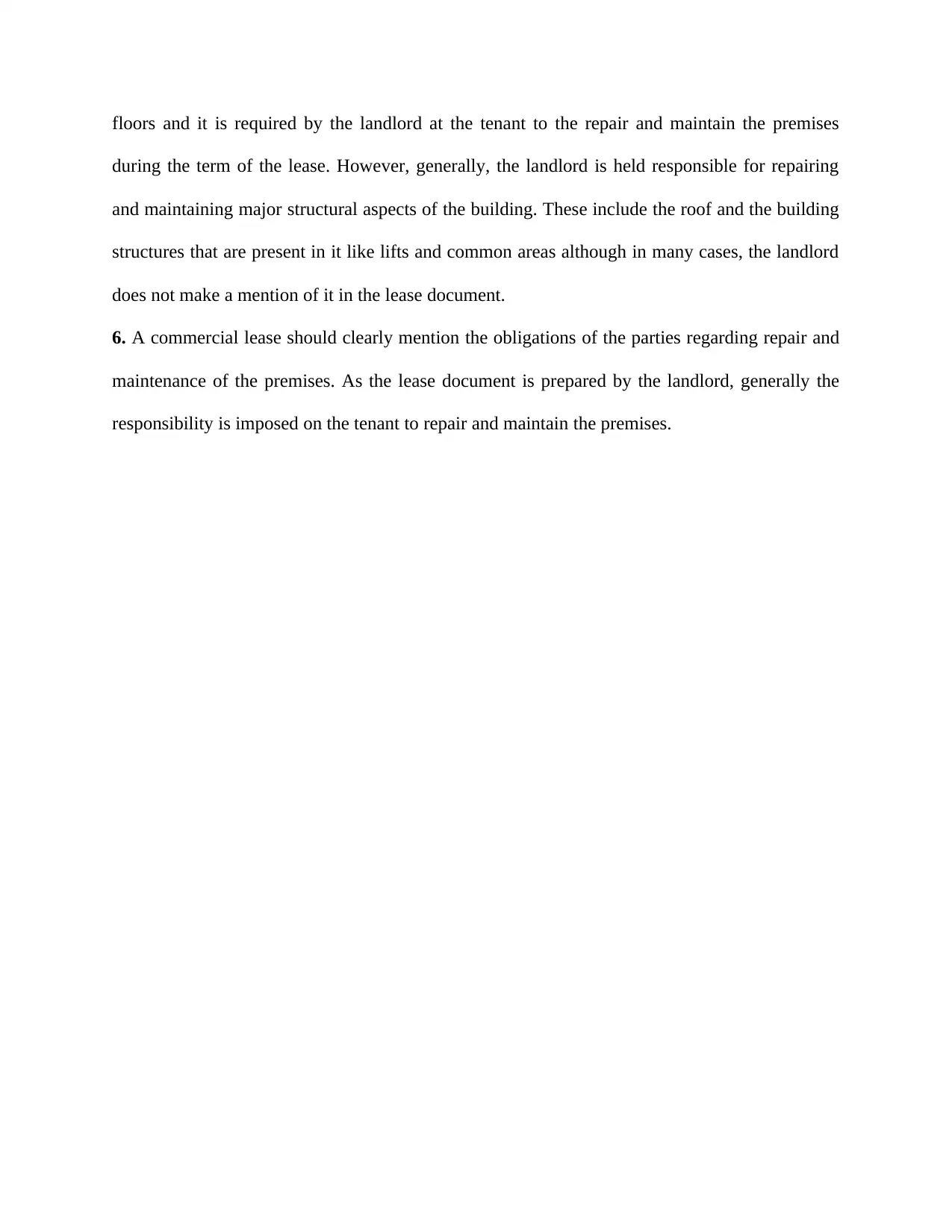
floors and it is required by the landlord at the tenant to the repair and maintain the premises
during the term of the lease. However, generally, the landlord is held responsible for repairing
and maintaining major structural aspects of the building. These include the roof and the building
structures that are present in it like lifts and common areas although in many cases, the landlord
does not make a mention of it in the lease document.
6. A commercial lease should clearly mention the obligations of the parties regarding repair and
maintenance of the premises. As the lease document is prepared by the landlord, generally the
responsibility is imposed on the tenant to repair and maintain the premises.
during the term of the lease. However, generally, the landlord is held responsible for repairing
and maintaining major structural aspects of the building. These include the roof and the building
structures that are present in it like lifts and common areas although in many cases, the landlord
does not make a mention of it in the lease document.
6. A commercial lease should clearly mention the obligations of the parties regarding repair and
maintenance of the premises. As the lease document is prepared by the landlord, generally the
responsibility is imposed on the tenant to repair and maintain the premises.
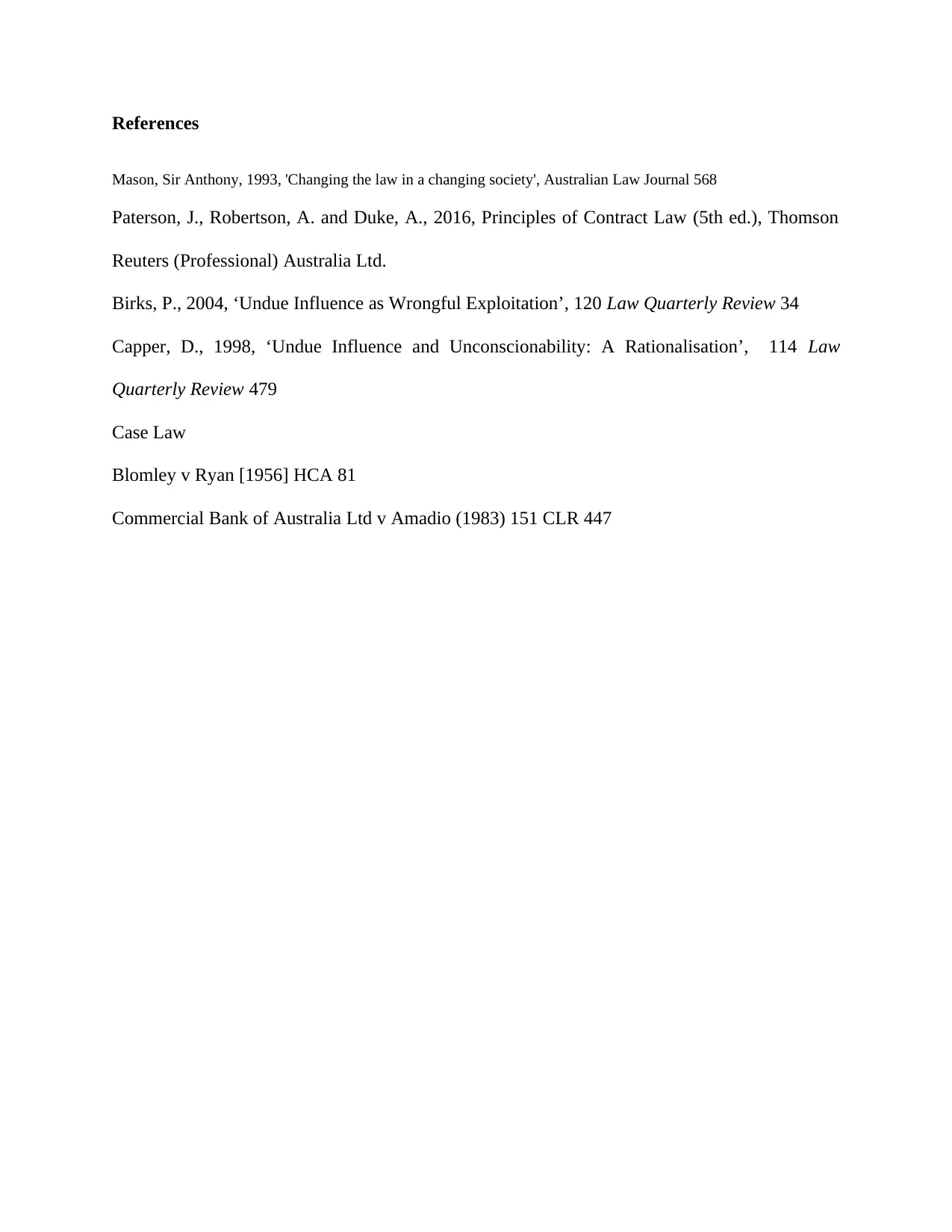
References
Mason, Sir Anthony, 1993, 'Changing the law in a changing society', Australian Law Journal 568
Paterson, J., Robertson, A. and Duke, A., 2016, Principles of Contract Law (5th ed.), Thomson
Reuters (Professional) Australia Ltd.
Birks, P., 2004, ‘Undue Influence as Wrongful Exploitation’, 120 Law Quarterly Review 34
Capper, D., 1998, ‘Undue Influence and Unconscionability: A Rationalisation’, 114 Law
Quarterly Review 479
Case Law
Blomley v Ryan [1956] HCA 81
Commercial Bank of Australia Ltd v Amadio (1983) 151 CLR 447
Mason, Sir Anthony, 1993, 'Changing the law in a changing society', Australian Law Journal 568
Paterson, J., Robertson, A. and Duke, A., 2016, Principles of Contract Law (5th ed.), Thomson
Reuters (Professional) Australia Ltd.
Birks, P., 2004, ‘Undue Influence as Wrongful Exploitation’, 120 Law Quarterly Review 34
Capper, D., 1998, ‘Undue Influence and Unconscionability: A Rationalisation’, 114 Law
Quarterly Review 479
Case Law
Blomley v Ryan [1956] HCA 81
Commercial Bank of Australia Ltd v Amadio (1983) 151 CLR 447
⊘ This is a preview!⊘
Do you want full access?
Subscribe today to unlock all pages.

Trusted by 1+ million students worldwide
1 out of 6
Related Documents
Your All-in-One AI-Powered Toolkit for Academic Success.
+13062052269
info@desklib.com
Available 24*7 on WhatsApp / Email
![[object Object]](/_next/static/media/star-bottom.7253800d.svg)
Unlock your academic potential
Copyright © 2020–2026 A2Z Services. All Rights Reserved. Developed and managed by ZUCOL.



